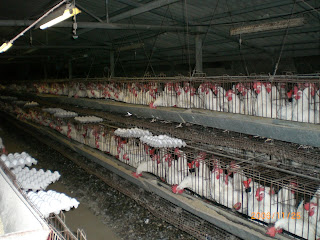Which Came First? The Salmonella or the Punitive Damages?
 Mmmmmm, salmonella. It will be a while before I enjoy an omelet again. You can read Holt v. Quality Egg, LLC, 2011 WL 1113780 (N.D. Iowa March 25, 2011) and see why. Due to a 2010 outbreak of salmonella allegedly stemming from the defendant’s products, the plaintiffs sought punitive damages, and Quality Egg moved to dismiss those claims. Quality Egg’s motions were denied. In short, the plaintiffs were able to use offensively information from an FDA form that found some “problems” at the egg facilities in (John) Galt, Iowa, and the facts set forth in this opinion surely reflect the unabashed capitalism set forth in the made for Tea Party movie, Atlas Shrugged. The FDA found the following physical manifestations of grossness:
Mmmmmm, salmonella. It will be a while before I enjoy an omelet again. You can read Holt v. Quality Egg, LLC, 2011 WL 1113780 (N.D. Iowa March 25, 2011) and see why. Due to a 2010 outbreak of salmonella allegedly stemming from the defendant’s products, the plaintiffs sought punitive damages, and Quality Egg moved to dismiss those claims. Quality Egg’s motions were denied. In short, the plaintiffs were able to use offensively information from an FDA form that found some “problems” at the egg facilities in (John) Galt, Iowa, and the facts set forth in this opinion surely reflect the unabashed capitalism set forth in the made for Tea Party movie, Atlas Shrugged. The FDA found the following physical manifestations of grossness:
Chicken manure located in the manure pits below the egg laying operations was observed to be approximately 4 feet high to 8 feet high
Un-baited, unsealed holes appearing to be rodent burrows located along the second floor baseboards
Dark liquid which appeared to be manure was observed seeping through the concrete foundation to the outside of the laying houses
The house entrance door to access both House 11 and 12 was blocked with excessive amounts of manure in the manure pits
Live and dead flies too numerous to count were observed at the following locations inside the egg laying houses
It’s not a stretch to say that the plaintiffs pleaded that Quality Egg ran its business in a manner where salmonella contamination was likely to occur. Frequently, I like to wax economical, and I have to agree with the defendant’s course of business here. Given the facts, I think any rational actor choosing between cleaning up 8 feet of chicken manure and the chance of having to pay punitive damages would pay the punitive damages. Other trial strategies of the defendant include using real evidence rather than demonstratives. The smell of the manure will truncate jury deliberations.
I suppose that the lesson learned from this case is that grossness will support a claim for punitive damages. Or that business practices should be reviewed in light of the potential for litigation. Maybe the Quality Egg officers looked at those large piles of dung and thought that nothing would happen, or that the piles would take care of themselves. That was not the case. This is probably a case where some good science and statistics could have informed the egg laying practices: Small piles of manure – small chance of passing salmonella to eggs. Big piles of manure – big chance of passing salmonella. We posted earlier that the industry standard should be allowed a little more weight as a method of explaining business practices to a jury, but I can’t think that the industry standard would be of much help here. The small problems of today can compound and become mountains of manure that are hard to handle in the future.














